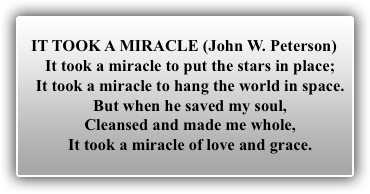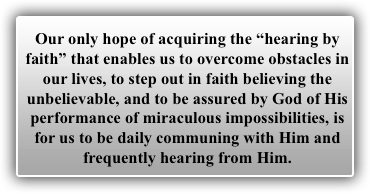Contrary to popular belief, faith, saving faith, not spurious faith, is neither decisional nor humanly manufactured. It’s not a mere matter of deciding to believe and exercising one’s believed ability to do so. This popular, but unscriptural notion, explains the abundance of false professions and prolific apostasy in the contemporary church. Many today, as Jesus taught, profess Him with their lips, saying “Lord, Lord,” while their hearts are far from Him, a fact proven by their failure to faithfully follow God’s Word and to fulfill His will in their lives.1
The Bible speaks of a spurious faith. Not all faith is saving faith. It is possible to profess and even possess a faith that falls short of salvation.
In our Lord’s parable of the sower, He tells how some of the seed is “sown upon a rock.”2 Later, when asked by His disciples about the parable, Jesus explains that the seed “on the rock are they, which, when they hear, receive the word with joy, and these have no root, which for a while believe, and in time of temptation fall away.”3 Notice, these spurious believers not only “hear” and “receive the word with joy,” but they also “believe,” at least for awhile. Their faith soon fails them, however, when it is put to the test “in a time of temptation.” Why do they fall away? It is because theirs is a spurious faith that falls far short of salvation.
disciples about the parable, Jesus explains that the seed “on the rock are they, which, when they hear, receive the word with joy, and these have no root, which for a while believe, and in time of temptation fall away.”3 Notice, these spurious believers not only “hear” and “receive the word with joy,” but they also “believe,” at least for awhile. Their faith soon fails them, however, when it is put to the test “in a time of temptation.” Why do they fall away? It is because theirs is a spurious faith that falls far short of salvation.
In John 2:23-25, we are told about the spurious faith of “many” who were in Jerusalem to practice their religion and observe the Passover. According to John, these Jews believed on Jesus, “when they saw the miracles which he did.” Yet, despite their faith, Jesus refused to “commit himself unto them, because he knew all men.” What was it about the faith of these believers that kept Christ at a distance from them? Was it not the fact that Jesus “knew what was in man”? Hence, he refused to “commit himself unto them.” He only commits Himself to those with God-given saving faith, never to those with human fabricated spurious faith.
In Acts 8:9-24, we are told about the spurious faith of Simon the Sorcerer. Simon not only “believed” but was also “baptized.” Shortly afterward, he was condemned by the Apostle Peter for still being “in the gall of bitterness, and in the bond of iniquity.” How could this be? Did Simon lose his salvation shortly after receiving it? Absolutely not! One cannot lose what he never had. Simon was never saved to start with. His was a spurious faith, not a saving faith.
The Apostle Paul warned the Corinthians about the danger of “believing in vain.”4 As one who believed all the Scripture (Old Testament) before his conversion, Paul understood the danger of possessing a faith that falls far short of salvation. Perhaps, this explains why he admonishes us to “examine ourselves” and “prove ourselves” as to “whether” or not “we are in the faith.”5
Much to the chagrin of the contemporary church, the Bible clearly teaches that today’s version of saving faith left the Rich Young Ruler lost, walking away from Christ without the eternal life he came to the Savior seeking.6 The Rich Young Ruler did everything the contemporary church teaches one must do to be saved. He came to Christ publicly, professing, praying, and believing. However, he went away lost, not saved. Christ’s disciples were so astonished by this, especially when the Rich Young Ruler’s morality and religious upbringing were added to his public profession and plea (prayer) for eternal life,7 that they asked, “Who then can be saved?” Jesus poignantly answered, “With men it is impossible, but not with God: for with God all things are possible.”
 According to Christ, salvation is a miracle of God that is impossible apart from God! It is not a mere matter of a sinner deciding to believe in Jesus—making his or her decision for Christ. Instead, it is a miraculous work of regeneration that God must miraculously perform on our behalf, because we are completely incapable of doing anything in regards to our own salvation.
According to Christ, salvation is a miracle of God that is impossible apart from God! It is not a mere matter of a sinner deciding to believe in Jesus—making his or her decision for Christ. Instead, it is a miraculous work of regeneration that God must miraculously perform on our behalf, because we are completely incapable of doing anything in regards to our own salvation.
In James 2:19, the Scripture issues to us a most solemn warning against the spurious faith being sold today as saving faith. According to James, devils believe the truth about God, but that doesn’t make them Christians. Neither will it make you a Christian. Granted, you can’t become a Christian without it, but the mere nodding of your head to the proportional truth of a Gospel presentation and agreeing afterward to repeat the “sinner’s prayer” after some well-meaning but misguided Christian no more makes you a shoo-in for Heaven than it would the devil.
As we’ve already stated, faith, saving faith, not spurious faith, is not as simple as the contemporary church makes it out to be. It is not a mere matter of us deciding to believe and then doing so. Granted, that we must believe to be saved is an irrefutable truth of Scripture.8 However, the question is our ability to do so. Are we capable, as is commonly believed today, of believing in Christ whenever we decide to do so?
Saving faith, as the Apostle Paul teaches in Ephesians 2:8-9, is not “of ourselves,” but “is the gift of God.” It is not something we can work up within ourselves anytime we take a notion, as is popularly believed today. Instead, it is a gift of God, something God must graciously give us. God must grant it; we can’t generated it.
 The Bible teaches us that “faith comes by hearing, and hearing by the word of God.” The Greek word translated “word” in Romans 10:17 is “rehema,” which means “spoken word.” It is not the Greek word “logos,” which means “written word.” Many people erroneously believe that this key verse on the subject of faith teaches us that faith comes from the Bible—the written Word of God. The truth, however, is that this verse actually teaches us that faith only comes from the spoken Word of God; that is, from God’s written Word—the Holy Scripture—being spoken personally and directly to our hearts by God’s Holy Spirit.
The Bible teaches us that “faith comes by hearing, and hearing by the word of God.” The Greek word translated “word” in Romans 10:17 is “rehema,” which means “spoken word.” It is not the Greek word “logos,” which means “written word.” Many people erroneously believe that this key verse on the subject of faith teaches us that faith comes from the Bible—the written Word of God. The truth, however, is that this verse actually teaches us that faith only comes from the spoken Word of God; that is, from God’s written Word—the Holy Scripture—being spoken personally and directly to our hearts by God’s Holy Spirit.
Faith is only made possible when the written Word of God becomes the spoken Word of God. It happens when the written Word of God is quickened off the page and made to come alive in our hearts by the Hoy Spirit of God. Then, and then only, can we truly believe!
Now, this key verse on the subject of faith in no way diminishes the importance of reading the Bible or of hearing it preached. God’s Spirit may speak His Word to our hearts while we are reading the Scripture or hearing a sermon. Still, it is hearing God, not reading the Bible or hearing the preacher that produces faith.
While we are completely capable of conjuring up a spurious faith that never leads to salvation, we are completely incapable of summoning up within ourselves saving faith, or, as Peter put it, a “faith unto salvation” that reserves for us a heavenly, incorruptible, undefiled, and eternal inheritance.9 Saving faith is had only by the gracious hand of God! It only comes when the Holy Spirit transforms the written Word into the spoken Word by speaking it personally and directly to our hearts. Only then can a sinner be saved by God’s grace through faith in God’s Son.
The Bible repeatedly warns us not to harden our hearts on the day we hear God’s voice.10 It is only when we are hearing God’s voice that we can respond to it in faith.11 For instance, we can only come to Christ when the Spirit of God personally calls us to come. If we harden our hearts when we hear God’s voice, we have no guarantee of ever hearing it again. Therefore, hardening your heart today to the voice of God—the conviction of the Holy Spirit—may make your coming to Christ by faith an impossibility tomorrow. No wonder the Scripture teaches us that “the day of salvation” and “the accepted time” for us to be saved is whenever we hear God’s voice.12
Contrary to popular opinion, we cannot be saved anytime we choose. In John 6:15, the multitude decided to force Jesus to be their king. Jesus, however, withdrew Himself from them. The moral of this story is that you can’t force Jesus to do anything. You can no more force Him to be your Savior on your terms and time than the multitude could force Him to be their king on their terms and time.
 Many people think they have their personal salvation all planned out. They’re going to strew their life with wild oats and afterward, around age 99, right before the sheet is pulled up over their head, they’re going to whistle for Christ to come and save them. This plot will supposedly enable these sly sinners to slip off their deathbeds right into Heaven, despite having lived lives of debauchery.
Many people think they have their personal salvation all planned out. They’re going to strew their life with wild oats and afterward, around age 99, right before the sheet is pulled up over their head, they’re going to whistle for Christ to come and save them. This plot will supposedly enable these sly sinners to slip off their deathbeds right into Heaven, despite having lived lives of debauchery.
The fatal flaw in this presumptuous plan is the fact that Christ doesn’t come to us whenever we say, but that we can only come to Him whenever He says. We can only come to Christ by faith and be saved when we are hearing His voice.
Just as the faith we exercise to come to Christ for eternal life is God-given, so also is the faith we exercise to live our Christian lives. This truth is largely unknown among modern-day Christians, despite its vital relevance and incredible importance. In fact, most of our struggles of faith are largely attributable to our ignorance of this Biblical fundamental of faith.
There is no way to overestimate the importance of faith in the Christian life. Over and over again the Bible teaches us that “the just shall live by faith.”13 Just as faith is the only way to be right with God, it is also the only way to live righteously for God. The Bible not only teaches us that without faith it is impossible for us to please God,14 but also that our only possibility apart from faith is to sin against God.15
According to the Scripture, we are to: 1. Pray in faith (Matthew 21:22; James 1:6) 2. Live by faith (Galatians 2:20) 3. Walk by faith (2 Corinthians 5:7) 4. Stand by faith (Romans 11:20; 2 Corinthians 1:24) 5. Approach God in faith (Ephesians 3:12) 6. Become more and more righteous by faith (Galatians 5:5) 7. Persevere in faith (1 Peter 1:5) 8. Work in faith (1 Thessalonians 1:3) 9. Be edified by faith (1 Timothy 1:4), and 10. Resist the devil in faith (1 Peter 5:8-9).
Whereas there is no question about the Scriptural and spiritual significance of faith, there is a question about its source. Is the overcoming faith of the victorious Christian life,16 unlike saving faith, humanly generated, or is it too doled out by the gracious hand of divine providence in accordance with the gracious purpose of divine election? Much to the chagrin of modern-day Christians, the latter, not the former, is the indisputable doctrine of Scripture.
The Bible clearly teaches us that “just as [we] received Christ Jesus as [our] Lord, [we are to] continue to live [our] lives in him.”17 We received Christ as our Lord through a God-given faith? Therefore, it is by a God-given faith that we are to live our lives in Christ. The faith needed to live for Christ is no more humanly manufactured than the faith needed to come to Christ. Both saving and sanctifying faith,18 the faith by which we are instantly converted and daily consecrated, are given to us by God. Neither can be worked up within ourselves nor personally procured.
The faith required for the miraculous in our Christian lives comes through Christ.19 Likewise, it is only this Christ-given faith—“hearing by faith”—that results in the miraculous ministry of the Holy Spirit in our churches.20 The Apostle Paul taught us “not to think of [ourselves] more highly than [we] ought to think,” but to think of ourselves “soberly, according [to] how God has [graciously] dealt to [us our particular] measure of faith.”21 Here, we learn that God not only gives us faith, but also gives it to us in different measures and degrees. Furthermore, the Bible teaches us that it is possible for our measure of faith to be increased and for our faith to be strengthened by being supplied with whatever it is lacking.22
In Mark 9:14-29, we are told the interesting story of the man who brought his demon-possessed and epileptic son to Christ for deliverance. Following the failure of Christ’s disciples to heal the boy, the man turned to Jesus—who had just returned from the Mount of Transfiguration—and asked our Lord, “Can you do anything to help us?” Jesus quickly retorted, “The question is not whether or not I can do anything, but whether or not you can believe.” Our Lord then added, “All things are possible to him that believes.” Upon hearing this, the man cried out to Christ, “Lord, I believe, but help my unbelief.” The question posed by this perplexing passage is how is it possible for a believer to need help with his or her unbelief.23
Notice, Jesus did not rebuke this man for his seeming self-contradiction. Therefore, it must be possible for a believer to need help with his or her unbelief. There are times in life when we are standing by faith and some tragedy suddenly strikes or some trouble suddenly comes and knocks us off our feet. It is at these times that we may find our present measure of faith too weak to bear up under the burden of unexpected calamity and too small to stand up to some giant problem that has arisen in our lives. It is then that we, like the father of the epileptic boy, need to cry out to Christ to help our unbelief; that is, to increase and strengthen our faith so that we can courageously stand up to any calamity and combat any threatening giant confronting us.
Since Christ miraculously delivered the demonized epileptic boy, we can safely conclude that his father’s request for Jesus to help him overcome his unbelief was graciously granted. However, the question is: “How did Jesus strengthen and shore up this father’s struggling faith?” The answer is by giving this struggling believer an assuring Word that assured him of Christ forthcoming amazing work.24 Christ said to this fretting and fearful father, “Bring your son to me,”25 which assured him that Christ was about to miraculously answer his prayer and deliver his son.
Just as saving faith comes when we initially hear God’s Word spoken personally to our hearts on the day of our  salvation, overcoming faith comes by continuously hearing God’s Word spoken to our hearts in our daily Christian lives. For instance, daily praying for the sick carries with it no guarantee of their healing. While we may be praying in faith by believing that God answers prayer and can heal, we’re still not assured by some assuring Word from God that it is His will to do so.26 If, however, the Holy Spirit speaks personally to our heart an assuring Word, revealing to us God’s will to heal some sick person we’re praying for, we can then, and only then, pray “the prayer of faith [that] saves the sick.”27
salvation, overcoming faith comes by continuously hearing God’s Word spoken to our hearts in our daily Christian lives. For instance, daily praying for the sick carries with it no guarantee of their healing. While we may be praying in faith by believing that God answers prayer and can heal, we’re still not assured by some assuring Word from God that it is His will to do so.26 If, however, the Holy Spirit speaks personally to our heart an assuring Word, revealing to us God’s will to heal some sick person we’re praying for, we can then, and only then, pray “the prayer of faith [that] saves the sick.”27
It has been astutely observed that anyone who has never believed God for the impossible has never really believed. The Bible shows us over and over again that no one can step out in faith to profess or perform the impossible until they’ve heard God speak personally and directly to them. Anyone who attempts to do so otherwise is acting in presumption, not faith, and will not only have their profession proven false, but will be proven foolish as well by their failed attempt at pulling off the impossible. Instead of exalting Christ, they will prove to be an embarrassment to Him and an encumbrance to His cause.
 It is only when God’s voice has spoken personally to our hearts that we are given the confidence to step out and believe the unbelievable. Consider the following Biblically examples, which present us with Scriptural proof of this salient point:
It is only when God’s voice has spoken personally to our hearts that we are given the confidence to step out and believe the unbelievable. Consider the following Biblically examples, which present us with Scriptural proof of this salient point:
- Israel’s conquest of Jericho. (Joshua 5:13-6:27)
- The cleansing of Naaman’s leprosy. (2 Kings 5:1-14)
- Jesus’ healing of the crippled man. (Mark 2:1-12)
- Jesus’ healing of the man with the withered hand. (Mark 3:1-5)
- Jesus’ commissioning of His 12 disciples. (Matthew 10:1-8)
- Jesus’ invitation to Peter to come to Him on the water. (Matthew 14:22-29)
- Paul’s bold declaration that their would be no casualties during a shipwreck on the stormy sea. (Acts 27:1-44)
It takes continuous communion—communication—with God to acquire the “hearing by faith” that overcomes the world.28 A good example of this is God’s plan for victory over Jericho. In order to get to the Promised Land, Israel had to overcome Jericho, which stood between them and God’s will for their lives. To further complicate matters, it was humanly impossible to overcome Jericho. The walls of Jericho were 60 feet high and 30 feet wide. Israel couldn’t climb over them, tunnel under them, or just go around them. Still, the walls had to come down and Jericho had to be defeated if the people of God were to inherit God’s promises.
How could Jericho be defeated? There was no known way for this to be done. The unknown became known, however, through communion. God revealed His unbelievable battle plan for Israel to win this impossible victory over Jericho to Joshua. We are told that “the Lord said unto Joshua, ‘See, I have given into thine hand Jericho’” (Joshua 6:2). The Lord then proceeded to lay out before Joshua the unbelievable battle plan for Israel’s conquest of Jericho.29
It is important to note that the Bible speaks of the Lord speaking to Joshua no less than 6 times in the first 6 chapters of the Book of Joshua.30 Obviously, Joshua was a man who lived his life in communion with God. Consequently, he received a personal word from God revealing to him God’s battle plan for victory over Jericho. As a result, he was given confidence to step out in an unwavering faith and believe the unbelievable and to unhesitatingly lead Israel to attempt the unimaginable.
 It is only those, like Joshua, who have an intimate personal relationship with God, to whom God will reveal His battle plans for overcoming obstacles. Therefore, our only hope of acquiring the “hearing by faith” that enables us to overcome obstacles in our lives, to step out in faith believing the unbelievable, and to be assured by God of His performance of miraculous impossibilities, is for us to be daily communing with Him and frequently hearing from Him.
It is only those, like Joshua, who have an intimate personal relationship with God, to whom God will reveal His battle plans for overcoming obstacles. Therefore, our only hope of acquiring the “hearing by faith” that enables us to overcome obstacles in our lives, to step out in faith believing the unbelievable, and to be assured by God of His performance of miraculous impossibilities, is for us to be daily communing with Him and frequently hearing from Him.
The profusion of presumption in the contemporary church is easily explained by the absence of intimate communion with God among contemporary Christians. For instance, today’s Christians see prayer as a monologue, not a dialogue. They see it as a mere matter of them talking to God. They expect God to do all of the listening, while they do all of the talking. Furthermore, prayer is no more to them than an attempt to persuade God to do their will. It has nothing to do with us hearing God and submitting our will to God’s revealed will.
 Many contemporary Christians confuse faith with presumption. They believe we can presume upon God for whatever we want. If our presumption is strong enough, God is forced into granting all of our wishes. Take for example today’s Positive Confession Movement.
Many contemporary Christians confuse faith with presumption. They believe we can presume upon God for whatever we want. If our presumption is strong enough, God is forced into granting all of our wishes. Take for example today’s Positive Confession Movement.
This popular movement is definitely manned by presumptuous souls. It proposes that things are brought to pass by nothing more than the power of our confession. In other words, we confess things to make them so. How foreign to the Scripture, which teaches us to confess things because they are so.31
 Nowhere does the Bible instruct us to confess our wish list. Neither does it promise that by doing so we can transform God into our own personal genie. Far from confessing our wishes, the Bible teaches us to confess God’s Word. We are to confess what God says. When we confess what God says, we are acting in faith. On the other hand, when we confess what we seek, especially in an attempt to strong-arm God into giving it to us, we are acting in presumption.
Nowhere does the Bible instruct us to confess our wish list. Neither does it promise that by doing so we can transform God into our own personal genie. Far from confessing our wishes, the Bible teaches us to confess God’s Word. We are to confess what God says. When we confess what God says, we are acting in faith. On the other hand, when we confess what we seek, especially in an attempt to strong-arm God into giving it to us, we are acting in presumption.
The Bible defines faith as “the substance [assurance] of things hoped for, the evidence [proof] of things not seen.”32 Faith is God-given assurance that proves we already have our God-given hopes! Notice, our hope, like our faith, is God-given.33 True faith is truly a miraculous thing. It is the certainty of unseen things and confidence in things that are humanly incomprehensible. Obviously, there is no way true faith can be attributable to us, since, apart from “mental illness,” there is no human explanation for it. Take for example our belief in the Genesis account of creation in these days of presupposed and prevalent evolutionary science.34 How is it that the Christian can confidently believe that the universe was spoken into existence by God out of nothing? Is it not made possible by faith alone, by the fact that God has endowed us with an inexplicable faith in His inerrant Word? As the Book of Hebrews teaches, “Through faith we understand that the worlds were framed by the word of God, so that things which are seen were not made of things which do appear.”35
I’ve often been accused by unbelievers of believing in “magic.” While I certainly disagree, I must admit that my Christians faith is nothing short of miraculous. It is truly a miraculous thing, only made possible by a supernatural enablement. It is not something I’ve decided to do in accordance with my own reason, but something I’ve been enabled to do by divine revelation.36 I’ve not been schooled in it by human tutelage, but by my Counselor, the Holy Spirit who teaches me all things.37 I haven’t come to it on the basis of my senses, but on the basis of what God has said to me personally through the Scripture and His Spirit.38 Although it is continuously under assault by the contradictory conclusions of my flesh, the creeds of this world, and the contentions of men, it is nonetheless divinely preserved.39 No wonder the Apostle Paul teaches us that all boasting is excluded once we understand that our faith is supplied by God, strengthened by God, and sustained by God.40
In Mark 1:15, Jesus admonishes us to “Repent and believe the Gospel”; that is, “the Good News.” We might even add, “the Good News that is so good it appears too good to be true.” The Greek word used for “repent” in the New Testament means, among other things, “to change one’s mind.” According to the Apostle Paul, the only way God’s “good, acceptable, and perfect will” will be revealed to us and realized in our lives is if we are “transformed by the renewing of our minds.”41 We must no longer be “conformed” to this fallen world’s way of thinking, but reprogramed to think differently. We must think with “the mind of Christ” by believing Christ’s thoughts, which the Spirit of Christ will reveal to us as we live out our Christian lives in communion with Him.42 Once Christ’s thinking is revealed to us by the Spirit, we are to repent of all contradictory thoughts43 and bring our every thought into obedience to Christ.44
As the above surely shows, overcoming faith to live the victorious Christian life is miraculously given by God to those who live their lives in close communion and constant communication with Him. Apart from a life of communion with Christ, a life within which we daily practice the “one thing needed”; namely, sitting at Christ’s feet and hearing His Word,45 there is no hope of us ever acquiring the overcoming “hearing by faith” vital to the victorious Christian life.
With the contemporary church’s prevalent belief that faith is a mere matter of our will and work—we can believe anytime we take a notion to—is there any wonder that Jesus asked whether or not He would find any faith on the earth when He returned?46 Today’s average Christian has no idea how lofty and impossible a summit we are called upon to scale in order to acquire the overcoming faith essential for us to live a victorious Christian life. For instance, we are commanded to “Repent and believe the Good News,” despite the fact that it sounds like an “idle tale” to our fallen ears upon this fallen earth.47 We are instructed to “live by…every word that proceedeth out of the mouth of God,” despite the fact that God’s voice can often be but “a faint whisper.”48 And we are commanded to purify ourselves with our hope of Heaven, despite the fact that the hereafter is like a poor reflection in a dim mirror in the here-and-now.49
Truly, to rise to the challenge and to acquire overcoming faith requires both constant rapport with God and continuous reliance upon God!
FAITH IS THE VICTORY (John H. Yates)
Encamped along the hills of light,
Ye Christian soldiers, rise.
And press the battle ere the night
Shall veil the glowing skies.
Against the foe in vales below
Let all our strength be hurled.
Faith is the victory, we know,
That overcomes the world.
Faith is the victory!
Faith is the victory!
Oh, glorious victory,
That overcomes the world.
His banner over us is love,
Our sword the Word of God;
We tread the road the saints above
With shouts of triumph trod.
By faith, they like a whirlwind’s breath,
Swept on o’er every field;
The faith by which they conquered death
Is still our shining shield.
Faith is the victory!
Faith is the victory!
Oh, glorious victory,
That overcomes the world. .
On every hand the foe we find
Drawn up in dread array;
Let tents of ease be left behind,
And onward to the fray.
Salvation’s helmet on each head,
With truth all girt about
The earth shall tremble beneath our tread,
And echo with our shout.
Faith is the victory!
Faith is the victory!
Oh, glorious victory,
That overcomes the world.
To him that overcomes the foe,
White raiment shall be given;
Before the angels he shall know
His name confessed in heaven.
Then onward from the hills of light,
Our hearts with love aflame,
We’ll vanquish all the hosts of night,
In Jesus’ conquering name.
Faith is the victory!
Faith is the victory!
Oh, glorious victory,
That overcomes the world.
FOOTNOTES
1. Matthew 7:21; 15:8
2. Luke 8:6
3. Luke 8:13
4. 1 Corinthians 15:2
5. 2 Corinthians 13:5
6. Mark 10:17-27
7.Mark 10:19-20
8. John 3:16; Acts 16:31; Romans 10:9-10
9. 1 Peter 1:4-5
10. Psalm 95:7-8; Hebrews 3:7-8, 15
11. See Numbers Chapter 14, especially verses 39-45
12. 2 Corinthians 6:2
13. Habakkuk 2:4; Romans 1:17; Galatians 3:11; Hebrews 10:38
14. Hebrews 11:6
15. Romans 14:23
16. 1 John 5:4
17. Colossians 2:6
18. Acts 26:18
19. Acts 3:16
20. Galatians 3:2, 5
21. Romans 12:3
22. 2 Corinthians 10:15; 1 Thessalonians 3:10
23. That the father believed is proven by the fact that he brought his son to Christ for deliverance.
24. Luke 9:43
25. Luke 9:41
26. 1 John 5:14-15
27. James 5:15
28. Galatians 3:2; 1 John 5:4
29. Joshua 6:2-5
30. Joshua 1:1; 3:7; 4:1, 15; 5:2; 6:2
31. According to the Bible, Christians overcome the devil by “the word of their testimony” (Revelation 12:11). The Word of our testimony is God’s Word, not our will nor wish list. We can only be a spiritual overcomer when we are confessing by faith what God says is so, not when we’re presumptuously confessing what we want, in some feigned hope of making it so.
32. Hebrews 11:1
33. 1 Peter 1:3, 21
34. I suspect unbelievers’ belief in evolutionary science may require every bit as much of supernatural enablement as our belief in the Genesis account of creation. For instance, they make fun of us for believing, “In the beginning God,” while they believe, “In the beginning nothing.” Which is more far fetched, to believe everything came from God or to believe everything came from nothing? Again, they poke fun at us for believing in a talking snake, while they believe we all came from talking apes. And they call the Bible a book of fairy tales, while they believe, like a fairy tale, that a frog can become a prince. Of course, their inexplicable beliefs are not God-given, but given to them by the “god of this world,” who has “blinded” their “minds…lest the light of the glorious gospel of Christ, who is the image of God, should shine unto them.” (2 Corinthians 4:4)
35. Hebrews 11:3
36. Matthew 16:16-17; Galatians 1:11-12
37. John 14:26
38. John 7:24; 2 Corinthians 5:7
39. 1 Corinthians 1:8; Jude 1:1
40. Romans 3:27
41. Romans 12:2
42. 1 Corinthians 2:9-16
43. Isaiah 55:8-9; 1 Corinthians 1:19-25
44. 2 Corinthians 10:4-5
45. Luke 10:38-42
46. Luke 18:8
47. Mark 1:15; Luke 24:11
48. Matthew 4:4; Job 26:14
49. 1 John 3:3; 1 Corinthians 13:12
You have the author's permission to print and freely distribute to others this entire manuscript or any portion thereof. If you would like to help us continue to offer complimentary resources, like The Miracle of Overcoming Faith, you can make a tax-deductible donation to "Time For Truth Ministries." To contribute just click the DONATE NOW button on our Home Page or mail your check or money order to: Time For Truth, P. O. Box 811, Townsend, TN 37882.
Recommend our website to a friend
Return to Books and Resources